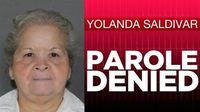Yolanda Saldívar, the woman serving a life sentence for the 1995 murder of Tejano music icon Selena Quintanilla-Pérez, was denied parole on March 27, 2025, just days shy of the 30th anniversary of Selena’s death. The Texas Board of Pardons and Paroles announced the decision, stating that Saldívar posed a continuing threat to public safety due to the violent nature of her crime.
Saldívar, now 64, had petitioned for parole for the first time this week. The parole panel cited the "nature of the offense" as the primary reason for the denial, noting that the record indicated elements of brutality and conscious disregard for the lives and safety of others. According to the board, the decision was made after a thorough consideration of all available information, including confidential interviews.
The Quintanilla family, including Selena's husband Chris Pérez, expressed gratitude for the decision, emphasizing their commitment to preserving Selena's legacy. In a joint statement shared on social media, they stated, "While nothing can bring Selena back, this decision reaffirms that justice continues to stand for the beautiful life that was taken from us and from millions of fans around the world far too soon." They also thanked Selena’s fans for their unwavering support over the years.
Selena Quintanilla-Pérez, known as the Queen of Tejano music, was born in 1971 in Lake Jackson, Texas. She began her music career at a young age, performing with her siblings in the band Selena y Los Dinos. Her unique blend of Tejano, pop, and cumbia music propelled her to superstardom in the early 1990s, with chart-topping hits like "Bidi Bidi Bom Bom," "Como la Flor," and "Amor Prohibido." In 1994, Selena won her first Grammy for Best Mexican/Mexican-American Album for her live recording, becoming the first female Tejano artist to achieve this honor.
Tragically, Selena’s life was cut short when she was shot by Saldívar on March 31, 1995, at the age of 23. The confrontation occurred at a Days Inn motel in Corpus Christi, Texas, where Selena had gone to retrieve business records from Saldívar, who had previously managed her fan club and clothing boutiques. Saldívar had been fired earlier that year after being accused of embezzling more than $30,000 from Selena’s businesses.
During the confrontation, Saldívar shot Selena in the back with a .38-caliber revolver. Selena managed to run out of the motel room and collapse in the lobby, where she was pronounced dead shortly after arriving at the hospital. Saldívar was arrested after a lengthy standoff with police, during which she claimed, "I didn’t mean to do it. I didn’t mean to kill anybody." She later stated that she had purchased the gun with the intention of taking her own life.
On October 23, 1995, a jury convicted Saldívar of first-degree murder, sentencing her to life in prison with the possibility of parole after 30 years. This marked a significant moment in the history of crime and celebrity, as Selena's death shocked fans and altered the landscape of Latin music. Saldívar's case was high-profile, and the trial was moved to Houston due to extensive media coverage.
Following her conviction, Saldívar sought to appeal her sentence multiple times, claiming that her rights had been violated during the trial. However, her appeals were consistently denied. In 1999, the Court of Criminal Appeals in Austin rejected her first request for a new trial, and subsequent appeals were also unsuccessful.
As the 30th anniversary of Selena’s death approached, the parole process for Saldívar began approximately six months prior to her eligibility date, which was set for March 30, 2025. This process included compiling a comprehensive case file, which contained court documents, offense reports, and statements from both supporters and opponents of her release.
The Texas Board of Pardons and Paroles emphasized that the decision to deny parole was made independently by a three-member panel, requiring a majority vote to either grant or deny the request. Saldívar will not be eligible for another parole review until March 2030.
Selena’s legacy continues to thrive through her music and the impact she had on the Tejano genre. Her posthumous album, "Dreaming of You," released shortly after her death, debuted at number one on the Billboard 200 and featured beloved tracks like "I Could Fall in Love" and "Dreaming of You." In 2021, she was awarded a lifetime achievement award by the Grammys, and in 2017, she received a star on the Hollywood Walk of Fame.
Selena's story has been told through various documentaries and a biographical film starring Jennifer Lopez, which further cemented her status as a cultural icon. The impact of her life and untimely death resonates deeply within the Latino community and beyond, as she broke barriers for future generations of artists.
As fans around the world remember Selena on the anniversary of her death, they continue to celebrate her life, music, and the joy she brought to millions. The decision to deny parole for Saldívar reaffirms the commitment to justice for Selena and her enduring legacy.










